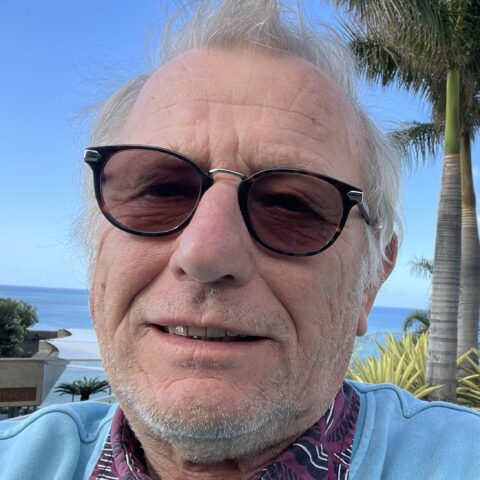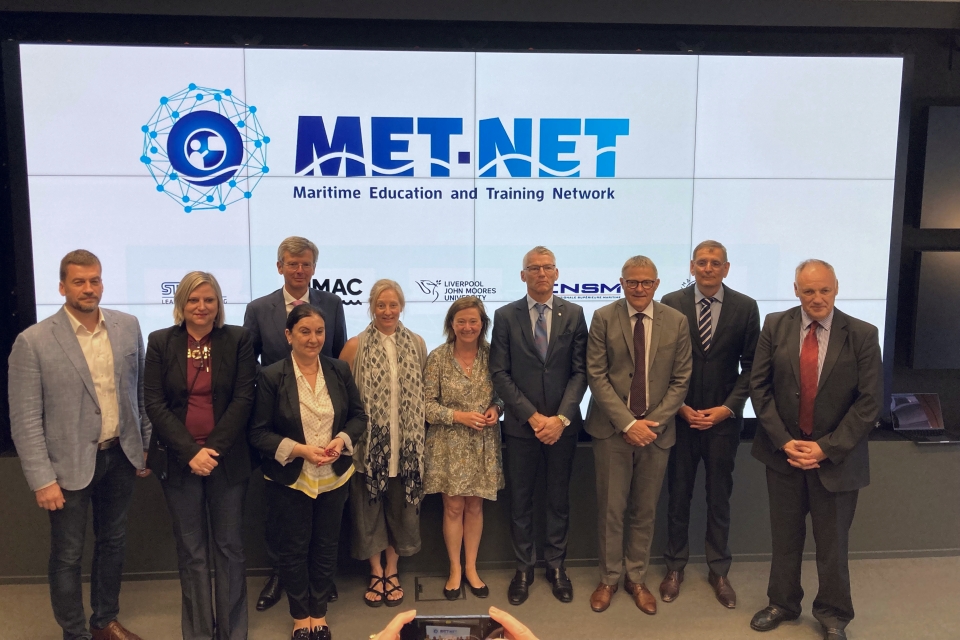Maritime education is facing major challenges. Rapidly changing technologies on the ships, digital transformation, and the need for greening vessels, demand new future-proof teaching programmes. To attract enough students again, the maritime sector must also offer them a more attractive perspective.

This article appeared (in Dutch) in SWZ|Maritime’s June 2023 issue and was written by maritime journalist Hans Heynen, hans.heynen@casema.nl.
The latter is a must in order to be able to compete with training programmes for other professions in the changing student market and to prevent students from dropping out prematurely.
‘It’s adapt and change or die,’ says Orestis Schinas, Professor of Shipping and Ship Finance at the Hamburg School of Business Administration (HSBA) at a seminar held on December 16, 2022, about new future-proof maritime teaching programmes developed within the European project SkillSea.
The project, which started 4.5 years ago, was concluded on May 31, with a closing conference in Brussels. Maritime institutions and organizations from all over Europe, including the UK, participated. The project, financed with money from the Erasmus + programme, was managed by the Rotterdam STC Group.
Also read: SkillSea: Maritime professionals need to be up- and reskilled
New SkillSea strategy
According to the participants, the SkillSea project has produced a new maritime skills strategy, which recommends that the curricula of maritime shipping courses adapt to trends and use modern technology and skills to reposition maritime professions. The educational institutions must ensure that maritime professionals have key digital, green and “soft” management skills for the rapidly changing maritime labour market.
Apart from developing a strategy for the education of sustainable skills, SkillSea looked for ways to increase the number of maritime professionals and improve the safety and efficiency of the sector.
MET-NET
Technical project coordinator Alco Weeke of SkillSea, senior lecturer of the STC, presented the “Maritime Education and Training Network” (MET-NET) at the closing conference in Brussels, a newly established partnership for European maritime training centres, many of which signed a Memorandum of Understanding during the conference.
According to Weeke, MET-NET is an important new educational link: ‘Universities have research partnerships, high schools of applied sciences have research partnerships with local industry, but practical maritime courses did not yet have a partnership, although they deliver most of the seafarers. We see that new skills are needed, that the intake of students is falling and that teachers leave the training institutes because there is no work for them. There are also teachers who are not familiar with the newly required skills. MET-NET wants to do something about that.’
An important goal of the “founding partners” of MET-NET is the development of new courses in the field of education, such as dealing with new fuels or learning how to safely start a hydrogen engine. Courses on digital skills and greening have already been developed during SkillSea. These courses are also important for maritime professionals already sailing. The rapidly changing technologies, digital transformation and an increasing focus on sustainability make it necessary for them to be trained and retrained on a large scale in the coming years.
Also read: MIWB wins Horizon grant for major European shipbuilding project
European training standard needed
One of the problems SkillSea ran into was the lack of standardised definitions. ‘Schools use different definitions to assess whether students have the necessary skills for the maritime sector,’ says Professor Damir Zec of the Maritime Faculty of the University of Rijeka at the closing meeting. ‘There are considerable differences between European maritime courses, not to mention differences with courses in the rest of the world.’
According to Zec, the STCW, the International Convention on Standards of Training, Certification and Watchkeeping for Seafarers of the IMO, does not always define requirements clearly enough either. ‘We have interviewed stakeholders to get clarity and our conclusion is that the STCW Convention is only about the necessary basic knowledge. Higher skills, such as analysis, synthesis and evaluation are not included. Recently developed expertise on digital and green techniques and new management skills (soft skills) are also lacking. We expect the gap between the knowledge and skills of the IMO/STCW baseline and the skills actually needed for maritime professionals to widen in the future, given the constantly changing techniques and technologies.’

Knowledge update for 5 million seafarers
Worldwide, around 5 million seafarers will need further training in these areas in the coming years. SkillSea surveyed seafarers and most were not happy with their current training situation. They feel they lack knowledge about new developments, such as green shipping (sustainability, decarbonisation) and digital technology.
‘For example, new fuels regularly come onto the market with new bunker techniques, about which they have little knowledge,’ says Zec. ‘Ships now have diesel engines, but will soon have various propulsion systems, with different fuels or energy sources.’
Gradual changes in this area are creating a growing demand for new skills. ‘That could be met with on-demand training,’ states Zec. ‘Classification companies, such as Lloyds, already offer additional training and that trend will grow. Shipowners will focus more on further training their people.’
Zec expects the basic requirements of the STCW to increase in the future. ‘But that will not be enough to close the gap with the knowledge that is actually needed. That gap is likely to get bigger in the future.’
Modern lesson packs
Project SkillSea has already developed a series of new teaching packages for maritime training. During the SkillSea seminar held in December, Professor Schinas presented the Green Skills 1 and Green Skills 2 teaching packages. Alex Barlow, from the FDNS School for Maritime at the Fleetwood Nautical Campus in Blackpool, presented the Digital Skills 1 package and Digital Skills 2 at the closing conference.
Also read: ‘Maritime sector is good for our economy and jobs’
Digital skills
‘Digital Skills 1 includes basic understanding of a ship’s digital landscape and useful skills for handling this technology at an operational level,’ says Barlow. ‘While young people have grown up with technology and have many basic digital skills, our experience is that there is no strong familiarity with technology beyond the general use of opening a web browser and clicking around and that they have very mixed levels of knowledge.’
The package includes a toolbox holding course specifications, outlines of the programme, constructive tuning, ideas for teaching lessons, samples for lesson plans, and directions to the latest research and online materials.
‘During a pilot in Blackpool with students without any sea experience, we started with digital context on the use of onboard data, weather routing, condition monitoring and preventive maintenance,’ says Barlow. ‘We discussed with the students how the key tasks were performed twenty years ago and five years ago and how they will be performed in five and twenty years from now. That made it clear how fast the world is changing.’
The curriculum also covers energy management systems, specialised OT networks and the general IT networks on board.

New functions
It is important to know who can repair an IT system on board when things go wrong. A modern ship is full of digital equipment that talks to each other. It is expected that in the future the captain and chief engineer will increasingly be supported by an ETO (Electrical Technical Officer) and a DTO (Digital-Data Analysing-Electronic Technical Officer). The large container ships often already have an IT specialist on board.
At the closing conference in Brussels, Barlow states via a video presentation that it had been important to be able to develop cybersecurity learning programs in collaboration with other institutes in Europe. ‘That gave us access to much more expertise than we had in-house.’
Barlow recommended that all trainers use the new SkillSea 1 and 2 packages for education and training purposes. British cadets from Blackpool said that the course helped them to recognise and repel digital attacks that threaten operational activity on board in a timely manner.
Also read: ‘Hundreds of thousands of seafarers will soon need training to decarbonise shipping’
Look at other education programmes and listen to the industry
According to Professor Schinas, to make maritime education attractive to young people, it is important that the educational content with modern tools is in line with current and future expectations and needs. It is a clever idea to look at the experiences and training models of other vocational training courses, such as aviation.
‘It is also very important to listen carefully to the maritime industry and to use their input and integrate it into the tools of the future.’
Switching between schools
Many students start a study in one country and would like to continue or complete it in another country. Then it is important that the modules that a maritime student has followed in Greece, for example, are equivalent and connect to Dutch or English modules and that the student can prove this.
Project SkillSea has developed a Transcript International Transfer (Trans I.T) for this purpose. This enables comparability of maritime training modules in Europe. This allows a Dutch or English program to see what the knowledge is of a transferring Greek or Italian student. This should improve the possibilities for student mobility, which will contribute to increasing the attractiveness of a maritime education.
MET-NET participants
Participants of MET-NET are the STC Group (Rotterdam, Netherlands), École Nationale Supérieure Maritime (Le Havre, France), Svendborg International Maritime Academy (Svenborg, Denmark), Liverpool John Moores University (Liverpool, England), University of Rijeka (Rijeka, Croatia), Constanta Maritime University (Constanta, Romania), Maritime Business School of Hamburg (Hamburg, Germany), Estonian Maritime Academy (Tallinn, Estonia) and Norwegian University of Science and Technology (Trondheim, Norway).
Picture (top): Group photo of the MET-NET founding partners at the SkillSea closing conference in Brussels (photo Skillsea).
Subscribers can read our complete June issue online here.








